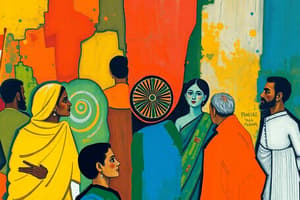Podcast
Questions and Answers
What is the primary function of the Fundamental Duties outlined in the Indian Constitution?
What is the primary function of the Fundamental Duties outlined in the Indian Constitution?
- To protect citizens' rights from government actions
- To provide guidelines for policy-making
- To outline citizen responsibilities (correct)
- To ensure individual freedoms are granted
Which type of democracy allows citizens to participate directly in decision-making?
Which type of democracy allows citizens to participate directly in decision-making?
- Parliamentary Democracy
- Federal Democracy
- Direct Democracy (correct)
- Representative Democracy
What are the Directive Principles of State Policy intended to provide?
What are the Directive Principles of State Policy intended to provide?
- Measures for the central government
- A framework for law enforcement
- Guidelines for state policy-making (correct)
- Individual rights protection
Why is voting considered a fundamental right in a democracy?
Why is voting considered a fundamental right in a democracy?
What role do political parties play in a democracy?
What role do political parties play in a democracy?
Which tier of local government operates in rural areas of India?
Which tier of local government operates in rural areas of India?
What is the supreme law of India which outlines the framework of governance?
What is the supreme law of India which outlines the framework of governance?
Which of the following is NOT considered a Fundamental Right in the Indian Constitution?
Which of the following is NOT considered a Fundamental Right in the Indian Constitution?
Flashcards are hidden until you start studying
Study Notes
Civics - Class 10 Study Notes
1. Introduction to Civics
- Definition: Civics is the study of the rights and duties of citizens and the workings of government.
- Importance: Understanding civic responsibilities and the political system is crucial for active participation in democracy.
2. Indian Constitution
- Source of Law: The Constitution is the supreme law of India.
- Key Features:
- Fundamental Rights: Guarantees individual freedoms (e.g., equality, freedom of speech).
- Fundamental Duties: Responsibilities of citizens (e.g., respecting the Constitution).
- Directive Principles of State Policy: Guidelines for the state in policy-making.
3. Democracy
- Definition: A system of government where power is vested in the people, who exercise it directly or through elected representatives.
- Types of Democracy:
- Direct Democracy: Citizens directly participate in decision-making.
- Representative Democracy: Citizens elect representatives to make decisions on their behalf.
4. Elections and Voting
- Electoral Process: Steps involved in conducting elections (voter registration, candidate nomination, polling, counting votes).
- Importance of Voting: Voting is a fundamental right and a means to influence government policy and leadership.
5. Political Parties
- Definition: Organized groups that seek to gain political power.
- Role of Political Parties:
- Represent diverse interests and ideologies.
- Mobilize voters and candidates for elections.
- Form governments and influence legislation.
6. Local Government
- Structure: Three tiers - Panchayati Raj (rural), Municipalities (urban), and state governments.
- Functions: Implementing local policies, managing resources, and providing public services.
7. Rights and Responsibilities of Citizens
- Fundamental Rights: Right to equality, freedom, protection against exploitation, and cultural and educational rights.
- Responsibilities: Respect the Constitution, promote harmony, and participate in community service.
8. Social Movements and Civic Participation
- Definition: Collective efforts by individuals or groups to promote social change.
- Examples: Women's rights movements, environmental activism, and anti-corruption movements.
- Importance: Encourage civic engagement and hold the government accountable.
9. Conclusion
- The study of civics empowers individuals to understand their role in society and contribute to the democratic process effectively.
Introduction to Civics
- Civics examines the rights and responsibilities of citizens along with government operations.
- Awareness of civic duties and the political framework is essential for meaningful engagement in democracy.
Indian Constitution
- Serves as the supreme law of India, guiding the legal and political framework.
- Fundamental Rights ensure essential freedoms such as equality and freedom of speech.
- Fundamental Duties outline citizen responsibilities, including upholding the Constitution.
- Directive Principles of State Policy serve as guiding principles for state policy-making.
Democracy
- Political system where the authority rests with the populace, exercised directly or via elected representatives.
- Direct Democracy allows citizens to partake directly in policy decisions.
- Representative Democracy involves electing representatives to make these decisions on behalf of citizens.
Elections and Voting
- The electoral process includes voter registration, candidate nomination, polling, and vote counting.
- Voting is a crucial right, serving as a powerful tool for citizens to influence government decisions and leadership.
Political Parties
- Political parties are organized entities aiming to acquire political power.
- They represent a spectrum of interests and ideologies, helping to mobilize voters and candidates during elections.
- Political parties also play a significant role in forming governments and shaping legislation.
Local Government
- Local governance operates on three tiers: Panchayati Raj (in rural areas), Municipalities (in urban settings), and state governments.
- Responsibilities include executing local policies, managing resources, and delivering community services.
Rights and Responsibilities of Citizens
- Fundamental Rights encompass the right to equality, freedom, protection from exploitation, and rights concerning culture and education.
- Responsibilities include respecting the Constitution, fostering social harmony, and engaging in community service.
Social Movements and Civic Participation
- Social movements are collective actions aimed at instigating social change.
- Notable examples cover women’s rights, environmental advocacy, and efforts against corruption.
- Such movements foster civic involvement and enhance governmental accountability.
Conclusion
- Understanding civics equips individuals to recognize their societal roles and effectively contribute to democracy.
Studying That Suits You
Use AI to generate personalized quizzes and flashcards to suit your learning preferences.




